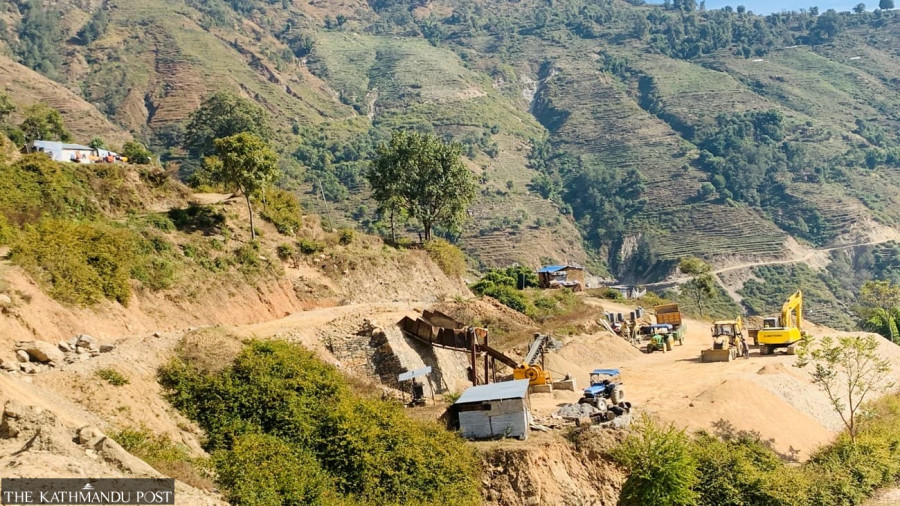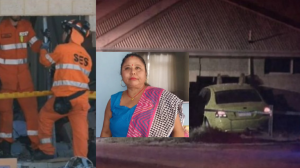Nepali Diaspora
Road and bridge projects drag on for years in Sudurpaschim
Authorities fail to take action against contractors responsible for delays. Despite repeated warnings, contractors have failed to improve performance.
Arjun Shah & Menuka Dhungana
Several infrastructure development projects under the Sudurpaschim provincial government have been left in limbo for years as authorities fail to take legal action against the contractors who delay the projects under various pretexts.
Contractors neither complete the projects on time nor do the authorities concerned take action against those responsible for the delays. Most of the road and bridge construction projects in the hill districts of Achham and Bajura remain incomplete well past their deadlines, but the government authorities limit their response to merely issuing warning letters to the contractors.
The Infrastructure Development Office in Achham oversees 13 road and six motorable bridge projects across Achham and Bajura. Two of the projects are classified as provincial pride projects. According to the Infrastructure Development Office, despite repeated deadline extensions 14 projects remain incomplete.
"On one hand, the allocated budgets remain idle in the office. On the other, the contractors are not working in the field," said Jung Bahadur Thapa, chief of the Infrastructure Development Office in Achham. Although the office has a budget of over Rs1.2 billion for the current fiscal year of 2024-25, less than Rs400 million has been spent so far.
As of now, the office manages 13 road contracts worth Rs3.57 billion, but none have been completed on time. Expenditures have already exceeded Rs1.89 billion, while the allocation for the current fiscal year is less than one-third of that amount, at Rs573 million.
In Bajura, the 40-kilometre Martadi-Kolti road remains incomplete for over eight years. Only about half of the work has been completed to date. The road construction began in 2018-19 with Baniya Kusheshwar JV contracted for a five-kilometre section at Rs121.1 million, but only 60 percent of the work has been completed so far. PS Baniya JV was awarded a 26-kilometre stretch for Rs501.6 million but has achieved just 50 percent completion in seven years.
Similarly, work on the Khaptad-Martadi road, a provincial pride project, is underway but at a snail’s pace. Contracts were awarded to three construction companies dividing the road in three sections in the fiscal year of 2018-19. The work progress in the three sections ranges between 31 and 70 percent.
In Achham, the road upgrade work on Jayagadh-Ramaroshan section has been stalled for two years. Awarded to Bajraguru Construction in 2019 for Rs247.7 million, it was supposed to be completed by July, 2022 but the project remains unfinished despite several deadline extensions. Although 80 percent of the budget has been released, the project remains incomplete and blacktopping work has yet to start.
The construction company, however, claimed that the work was halted due to a lack of budget. “The Infrastructure Development Office has not yet released Rs15.6 million for the work done in the last fiscal year of 2023-24. How can we continue without payment?” said Rabin KC, site in-charge of Bajraguru Construction.
Meanwhile, partial progress has been reported on other projects like the Chisapani-Jungleghat-Badimalika road, with multiple contracts showing limited or delayed results. The upgrading of the Vinayak Layati-Puletola-Ramaroshan and the Safebagar-Nandegad-Mellekh-Shodsha-Rishidaha road sections have achieved only 44 and 79 percent completion, respectively.
Motorable bridge projects in Achham and Bajura are also in disarray. Six bridge projects remain incomplete, with some like Barjugad bridge in Bajura, remaining unfinished even after a decade. According to the Infrastructure Development Office, of the Rs388.1 million allocated for these six bridges, just Rs132.6 million has been spent so far. Construction work of most of the bridges is less than halfway.
Despite repeated warnings, contractors have failed to improve work performance. Office chief Thapa said that contractors, often citing a lack of funds, delay work while the office can only release payments upon work completion. Taking punitive action, such as contract cancellation, is complicated, he said, as it creates uncertainty over project completion and risks cost escalation.
"Contractors complain about lack of credit facilities and loan access from banks," Thapa said. "While we have the authority to cancel contracts, it could make the situation worse, since there’s no guarantee new tenders would deliver better results. Our laws allow contract termination but offer no clear mechanism to ensure unfinished works are completed."




 20.12°C Kathmandu
20.12°C Kathmandu













